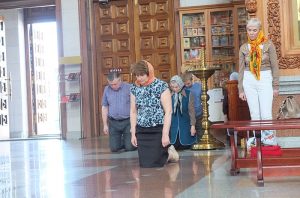Let us lift up our hearts!”
“We lift them up to the Lord!”
(Divine Liturgy)
At the start of the holiest part of the Divine Liturgy, we hear the call from the celebrant: “Let us lift up our hearts!” How do we do that? We know how it feels to be down-hearted. For some reason we may be sad and forlorn. We had been hurt by some event or person. Or maybe we are out of work, we failed an exam, or a blow to our pride and aspirations happened some time past and we had not gotten over it. The incident passed, but the memory of it lingered and caused a general attitude of depression and gloom.
We may say that we cannot get over it or we don’t want to – but this is not just an invitation; it’s a command. What are you doing here at the most sacred part of Christ’s Eucharist if you are not willing to take part in it? This is a mystical party, the most exclusive banquet that you can possibly imagine. You are invited by virtue of your baptism into Christ, and here you are – at least physically – but your heart is not in it. Or so you say.

“Let us,” means all of us. Just before the Creed an announcement had been made ordering the exclusion of all the catechumens, those not baptized and therefore not full members of the Body of Christ. “Body” here implies the assembly, the whole Church, but it also signifies “Mind, heart and soul” of Jesus Christ. Christ expects that you will add your own spiritual joy to the company of living saints, so that those who are gathered to share the precious Presence of the Lord will take from you some relic of happiness to nurture their own souls on the living God as they deal with their own challenges in the coming week. When you become a member of the Holy Church, you are no longer a mere individual with nobody to account for but yourself. You are obliged to share in the life of the spiritual community. Their joy is your happiness, and their problems are yours. They may ask you for contributions to offer for the needs of the world, the community, and the parish. That, you understand. Realize also that you are responsible for your attitude towards the Holy Trinity, the holy Church, and for your sisters and brothers in Christ.
It doesn’t mean that you should try to put on a happy face when your heart is filled with grief, but it calls on you to struggle with whatever afflicts your soul and infects your disposition. If you were an athlete on a ball team, you would understand the reason for being lifted from a game when you were out of sync with your team mates. So it is with the Church. Christ is the Healer of all suffering, the Comforter of all misery, the Giver of Peace to the perplexed. He has come into the world to find and to save us. He invites us to lift up our hearts to Him, and when we reply that we “lift them to the Lord,” we are assured that His incarnation was effective not just in the world at large, but within us; yet He cannot heal or help us without our cooperation. Meditate on what He has done for you.
“We can be lifted up toward the Most High only if the Lord who lifts up the humble has stooped down to what is below. That is why the soul that rises toward the things that are above asks the help of the Transcendent One and begs Him to descend from His majesty in order to become accessible to those who are below.” (St. Gregory of Nyssa)
Source: Orthodox Church in America



















